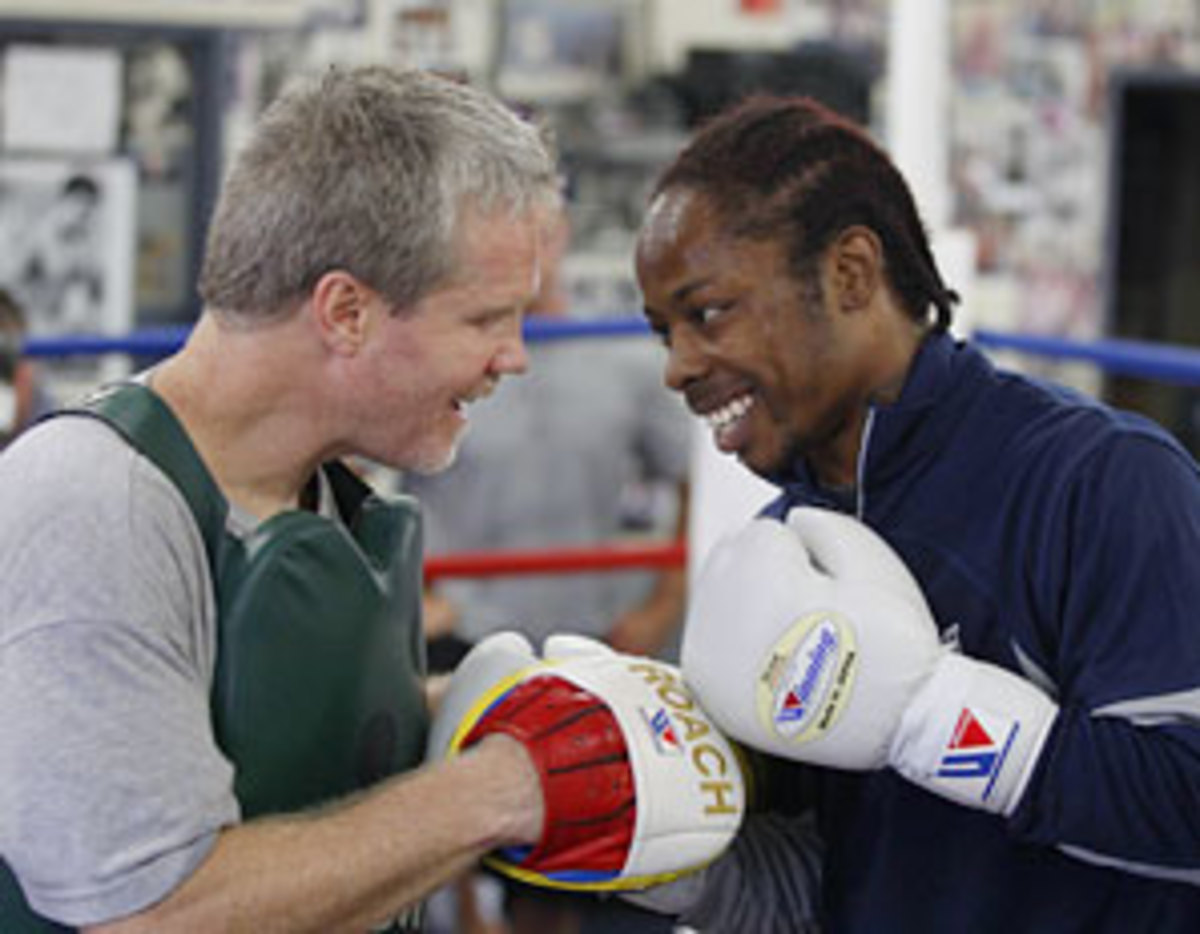Roach lends wisdom, expertise to reconstruction of USA Boxing
MOBILE, Ala. -- The look on Freddie Roach's face was familiar, that intent, focused stare that told you the mind of boxing's foremost trainer was humming.
The look is usually reserved for Manny Pacquiao or Amir Khan, prominent Roach charges who have emerged as superstars under his tutelage. But Roach wasn't here to watch Pacquiao, Khan or any of the other 14 pro fighters in his stable. Roach was here to serve in his capacity as a consultant for USA Boxing, the most well-known member of a new team of coaches, trainers and administrators who have been brought in to rebuild a program that has hit rock bottom.
"There has been a lot of criticism," Roach said. "I haven't been around amateurs since 1977. [But] it looks like we need some help. We are just not getting the job done."
Roach and a handful of other volunteer assistants (yes, volunteers) will work under national coach Joe Zanders, who was hired to replace Dan Campbell in January. The task is daunting: USA Boxing was once a breeding ground for future stars, with legends like Cassius Clay (1960), Joe Frazier (1964), George Foreman (1968), Sugar Ray Leonard (1976), Pernell Whitaker (1984) and Oscar De La Hoya (1992) winning gold medals while in the pipeline. Lately, medals -- any medals -- have been hard to come by.
The U.S. team won four medals in 2000, two in '04 and one in '08. Since De La Hoya's gold in '92, the U.S. has earned just two golds (David Reid, 1996; Andre Ward, 2004) and has not produced a mainstream star since bronze medalist Floyd Mayweather turned pro in '96.
Enter Roach, who knows a thing or two about developing winners. While Zanders and his staff will handle the day-to-day duties, Roach will have considerable input. He plans to visit the team's training center a few weeks at a time when his schedule opens up; he'll import fighters to his Wild Card Boxing Club in Los Angeles when it's not.
Last month, Roach spent three days in L.A. working with flyweight Rau'shee Warren and lightweight Raynell Williams. After working the pads with Warren, Roach noticed the two-time Olympian would often stand in front of his opponent and "admire his work" after throwing a combination, instead of ducking out of the way.
"I told him, 'You have to get out to the side and get that angle,'" Roach said. "These international guys are going to come right back at you. The more active ones are going to have success."
In addition to Roach, Warren and Williams spent time with Alex Ariza, Roach's longtime strength and conditioning coach who has been credited for developing the chiseled physiques of, among others, Pacquiao, Khan and Julio Cesar Chavez Jr. On one morning, Warren and Williams accompanied Ariza and Khan to a nearby pool. According to Roach, the two were taken aback by how much swimming Khan did during training. Warren, who can't swim, was so impressed that he vowed to take lessons so he could participate the next time.
Zanders, who has had a friendly relationship with Roach over the years, says he has already seen improvement.
"I was asked by the USOC if I would like to have Freddie as a strategist and it took me a bout a second-and-a-half to say, 'Hell yes,'" Zanders said. "Freddie will admit he doesn't know much about amateurs. But we're talking about fundamental technique. You throw a punch, you have got to think about defense. Rau'shee, he takes a lot of risk and unnecessarily gets scored upon. Freddie has been a big help with that."
A lack of quality sparring partners has been a problem for USA Boxing the last few years. In the past, fighters who were eliminated during the trials were brought to camp to spar with the ones who made the team. Roach has offered to make some of his pro fighters -- including, Roach says, Pacquiao -- available to the U.S. team. Instead of sparring against fighters they have already beaten with styles they are familiar with, U.S. boxers could face Chavez Jr. or Jorge Linares.
"These guys need to be pushed," Roach said. "Sparring with guys they have already beaten, it's like going through the motions. They need challenges. The sparring partners they are going to use are not going to be the losers. They will be my fighters [from] my gym. They will make these guys excel. They are going to have to put up or shut up at that point."
Certainly the 51-year-old Roach doesn't need the extra work. He's one of boxing's busiest trainers -- "I've got four title fights before the end of November," Roach said -- and his gym is always packed with prospects eager to catch his eye. But Roach started working with Pacquiao when he was a raw 122-pounder. He took on Khan right after Khan was flattened in 54 seconds in a fight with Breidis Prescott.
Simply put: Roach enjoys a challenge.
"We have to bring the U.S. team back to where it used to be," Roach said. "I remember the days of '76, of greatness, a lot of exposure. To be honest, the last Olympics, I didn't see any fights. You have to go to these remote cable stations to get them. We have to bring this sport back in America, and I think this is the way to do it. I think we need to teach these kids more skills, more feints. It's kind of a lost art. We have to do it. This is the future of boxing."






